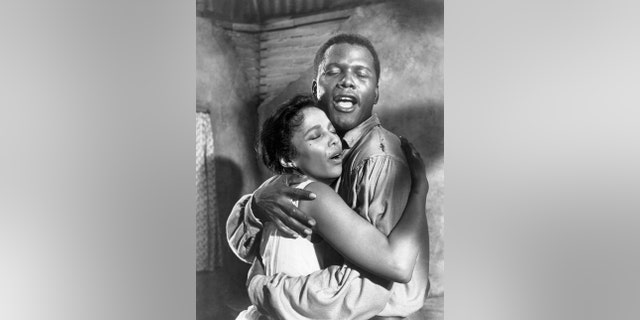Celebrities around the world are paying tribute to Sidney Poitier, the beloved Oscar-winning actor, following his death. He was 94.
The film icon’s death was confirmed to Fox News Digital on Friday by the Bahamian Ministry of Foreign Affairs Office. Prime Minister of the Bahamas Philip Davis also held a press conference on Friday morning where he remembered Poitier as an “actor and film director, an entrepreneur, civil and human rights activist and, latterly, a diplomat.”
In a statement to Fox News Digital, Denzel Washington said: “It was a privilege to call Sidney Poitier my friend. He was a gentle man and opened doors for all of us that had been closed for years. God bless him and his family.”
Danny Glover and Harry Belafonte both paid their respects to the actor.
“All of us who have walked in the shadow of Sidney Poitier owe him so much,” Glover said in a statement to Fox News Digital.
“For over 80 years, Sidney and I laughed, cried and made as much mischief as we could. He was truly my brother and partner in trying to make this world a little better. He certainly made mine a whole lot better,” Belafonte told Fox News Digital.
Stars also began paying tribute to Poitier on social media early Friday following the news.
Whoopi Goldberg took to Twitter, writing, “If you wanted the sky i would write across the sky in letters that would soar a thousand feet high.. To Sir… with Love Sir Sidney Poitier R.I.P. He showed us how to reach for the stars.”
SIDNEY POITIER, OSCAR-WINNING ACTOR, DEAD AT 94
American actor Sidney Poitier with his Oscar after he won the Academy Award for Best Actor in a Leading Role, at the Beverly Hilton Hotel in Hollywood, California, circa 1964.
(Photo by Archive Photos/Getty Images)
Actor Jeffrey Wright said: “Sidney Poitier. What a landmark actor. One of a kind. What a beautiful, gracious, warm, genuinely regal man. RIP, Sir. With love.”
George Takei recalled Poitier’s lengthy career in film, calling him a “trailblazer.”
“Sidney Poitier, the first Black man to win an Oscar, has died at the age of 94. The star of “Guess Who’s Coming To Dinner” and “Lilies of the Field,” for which he won Best Actor, was a trailblazer who will be mourned by so many for whom he opened the very doors of Hollywood,” Takei tweeted.
Piers Morgan noted Poitier’s milestone of becoming the first Black man to win an Oscar for best actor.
Joseph Gordon-Levitt called Poitier an “absolute legend. One of the greats.”
“Real Housewives” star Garcelle Beauvais shared a selfie she has with Poitier. “Rest in power mr Poitier! Your legacy will live on! Thank you for sharing your talent with us,” she wrote on Twitter.
Actress Viola Davis called Poitier’s death a “big one.”
“No words can describe how your work radically shifted my life. The dignity, normalcy, strength, excellence and sheer electricity you brought to your roles showed us that we, as Black folks, mattered!!! It was an honor…” a tweet from her account reads.
Taraji P. Henson thanked Poitier for “kicking down the doors.” “Thank you will never be enough for your blood sweat tears and determination. REST IN HEAVENLY PEACE!!! We will tell the generations to come about your legacy!!!,” she said in an Instagram tribute.
Octavia Spencer said she will never forget meeting Poitier.
“I had just won an award and he and Helen Mirren were walking through the kitchen to the stage to present. When I have an overload of adrenaline it has an adverse affect. I can’t bend my knees. So, there I am with my heels and an award in my hands, shell shocked and sweaty, GLARING at the two of them. I was searching for the one word to say but couldn’t remember any,” she recalled on Instagram.
Spencer’s post continues: “I must’ve been a pitiful sight because he stopped with the biggest smile and congratulated me. I finally blurted out I love you… both. He told me he expected great things from me. There’s something about hearing those words from a pioneer that changes you! Thank you, Mr. Poitier!! I’ve been riding high ever since!!”
Henry Winkler wrote: “Sidney Poitier was full of grace in every aspect of his life .. He opened doors with a BOOM that came from his gentle soul RIP ..”
Loni Love remembered her time meeting Poitier, calling it a “thrill” to be in his presence. “What a thrill it was to meet the legendary actor Sidney Poitier.. he made us all feel proud and was an inspiration to us in an industry that at times could not be welcoming.. thank you Mr. Poitier rest well.”
BETTY WHITE’S ILLINOIS HOMETOWN SEEKS TO HONOR LATE TV ICON

Sidney Poitier and Dorothy Dandridge filming ‘Porgy and Bess’, circa 1959.
(George Rinhart/Corbis via Getty Images)
In 1963, Poitier made a film in Arizona, “Lilies of the Field.” The performance led to a huge milestone: He became the first Black winner of a lead-acting Oscar. As one of the most beloved stars of Hollywood’s golden era, Poitier made his mark with films like “A Raisin in the Sun,” (1961) “Guess Who’s Coming to Dinner” (1967) and “Uptown Saturday Night,” (1974), among others.
In January of this year, Arizona State University has named its new film school after him. The Sidney Poitier New American Film School was unveiled at a virtual ceremony.
Poitier was born in 1927 in Miami, Florida, PBS shared. The star grew up in the small village of Cat Island, Bahamas. His father, a tomato farmer, moved his family to the capital when Poitier was 11. At a young age, Poitier was captivated by cinema and, at age 16, he moved to New York. He found work as a dishwasher and soon after, became a janitor for the American Negro Theater in exchange for acting lessons.
It was there where Poitier was given the role of understudying Harry Belafonte in “Days of our Youth.” Poitier made his public debut while filling in one night. Afterward, he earned a small role in the Greek comedy “Lysistrata.” Poitier continued to perform in plays until 1950 when he made his film debut in “No Way Out.”
Before Poitier, few Black actors were permitted a break from the stereotypes of bug-eyed servants and grinning entertainers. Before Poitier, Hollywood filmmakers rarely even attempted to tell a Black person’s story.
Poitier’s rise mirrored profound changes in the country in the 1950s and 1960s. As racial attitudes evolved during the civil rights era and segregation laws were challenged and fell, Poitier was the performer to whom a cautious industry turned for stories of progress.
He was the escaped Black convict who befriends a racist white prisoner (Tony Curtis) in “The Defiant Ones.” He was the courtly office worker who falls in love with a blind white girl in “A Patch of Blue.” He was the handyman in “Lilies of the Field” who builds a church for a group of nuns. In one of the great roles of the stage and screen, he was the ambitious young father whose dreams clashed with those of other family members in Lorraine Hansberry’s “A Raisin in the Sun.”
CLICK HERE TO SIGN UP FOR THE ENTERTAINMENT NEWSLETTER
Poitier peaked in 1967 with three of the year’s most notable movies: “To Sir, With Love,” in which he starred as a school teacher who wins over his unruly students at a London secondary school; “In the Heat of the Night,” as the determined police detective Virgil Tibbs; and in “Guess Who’s Coming to Dinner,” as the prominent doctor who wishes to marry a young white woman he only recently met, her parents played by Spencer Tracy and Katharine Hepburn in their final film together.
In recent years, a new generation learned of him through Oprah Winfrey, who chose “The Measure of a Man” for her book club. Meanwhile, he welcomed the rise of such Black stars as Denzel Washington, Will Smith and Danny Glover: “It’s like the cavalry coming to relieve the troops! You have no idea how pleased I am,” he said.
Poitier received numerous honorary prizes, including a lifetime achievement award from the American Film Institute and a special Academy Award in 2002, on the same night that Black performers won both best acting awards, Washington for “Training Day” and Halle Berry for “Monster’s Ball.”
Poitier had four daughters with his first wife, Juanita Hardy, and two with his second wife, actress Joanna Shimkus, who starred with him in his 1969 film “The Lost Man.” Daughter Sydney Tamaii Poitier appeared on such television series as “Veronica Mars” and “Mr. Knight.”

Halle Berry presents an award to Sidney Poitier during The 15th Carousel Of Hope Ball – Show and Audience at Beverly Hilton Hotel in Beverly Hills, California, United States.
(Photo by M. Caulfield/WireImage)
CLICK HERE TO GET THE FOX NEWS APP
The only Black actor before Poitier to win a competitive Oscar was Hattie McDaniel, the 1939 best supporting actress for “Gone With the Wind.” No one, including Poitier, thought “Lilies of the Field” his best film, but the times were right (Congress would soon pass the Civil Rights Act of 1964, for which Poitier had lobbied) and the actor was favored even against such competitors as Paul Newman for “Hud” and Albert Finney for “Tom Jones.” Newman was among those rooting for Poitier.
The Associated Press contributed to this report.